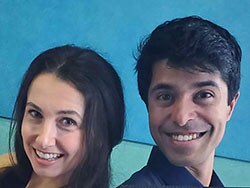Been There, Done That: First-Year Residents Share Match Day Advice
MATCH DAY #MATCHDAY

It’s Match season again, when med school graduates find out where they’ll train during the next few years of residency. Medscape Medical News asked a few residents who matched last year what advice they have for this year’s class. Here are some tips they shared.
“It Took a Village”J. Tyler Ramsey, DOMountain Area Health Education Center, Asheville, North CarolinaInternal Medicine
Are you ready to submit your final rank list? Tyler Ramsey has a few pointers to keep in mind before you hit “send.” Give some serious thought to where you see yourself in the next 5 to 10 years, he advises, and then compare that with the programs you’re considering. The residency path is “incredibly hard. You want a place that will support you.”

J. Tyler Ramsey
But it’s not all about the program, he says. “Also consider other supporting factors that are essential during residency, such as the proximity of family, friends, and significant others who will be there for you when you hit a hardship.”
Then comes the waiting. In addition to having a few close friends or family members you can turn to for support while you wait for the news, Ramsey suggests practicing meditation or mindfulness. It’s also helpful to alternately schedule times to think about The Match and to plan distractions — exercise, hanging out with friends, whatever you enjoy doing — to keep your mind off the matching process.
When Match Day finally arrives, don’t forget to share your appreciation for everyone who got you there, Ramsey says. “It took a village to get through the past 8 years to finally reach this exciting day. Be sure to plan a celebration with all of those people that supported you through this expedition.”
Matching the MatchedLiana Meffert, MDGeorgetown University, Washington, DCEmergency Medicine
The Match can be especially tricky if your partner is matching, too, and you hope to land in the same city — or at least close enough that you can live together. Liana Meffert and her now-husband Soham Ali matched as a couple last year. (Ali matched into internal medicine at the University of Virginia.)

Liana Meffert and Soham Ali
Meffert says the process goes deeper than coordinating two rank lists. “Deciding where to do residency (and where to live) as a couple can bring up a lot of bigger conversations about where you both want to actually end up and what sort of compromises you’re willing to make for one another,” Meffert says.
Meffert also advises not overcommitting for the spring. She anticipated having a lot of free time between matching and starting her residency. It didn’t turn out that way. “There will be a massive flurry of action after Match surrounding housing, moving logistics, et cetera,” she says. “You have essentially 3 to 4 months between finding out where you matched and starting residency. You’ll also want some time and space to process and strategize with your partner.”
Second Time’s the CharmRamie FathyJohns Hopkins Hospital, Baltimore, MarylandDermatology
So what if you don’t match? Last year Ramie Fathy matched with his first-choice program after going unmatched the previous year. Not matching was a blow, but a temporary one. After all, Fathy ultimately landed exactly where he wanted.

Ramie Fathy
If you don’t match this year, don’t lose heart. Just take it as a challenge from which you can grow and learn, Fathy says. He suggests seeking feedback on your application from mentors or from faculty of different residency programs with whom you interviewed, as they already reviewed your application. Once you know the weak spots in your application, spend the months between application cycles working on addressing these problems. Fathy also advises seeking projects, rotations, or positions that will give you new experiences to cite in your application or in interviews.
“Not matching is tough. You may feel disappointed, embarrassed, or demoralized,” he says. “But it’s also an opportunity to bounce back and grow from a challenge, learn about yourself and your interests, and use the time before reapplying in a way that you’ll be proud of down the line. As the saying goes, ‘Success is never final; failure is never fatal. It’s courage that counts.’ “
For more news, follow Medscape on Facebook, Twitter, Instagram, and YouTube.